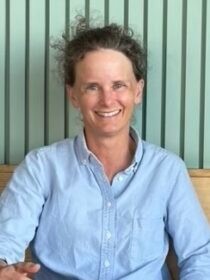How California’s Dr. Bronner’s Spiritual Messaging Became a Global Brand
By Eileen Luhr, author of Golden States: How California Religion Went from Cautionary Tale to Global Brand
Many of us are now familiar with Dr. Bronner’s Soaps, a family-owned business based in Vista, California known for the colorful and text-laden, spiritual messaging of its packaging. Yet behind this now popular brand lays a larger story of California as an important site for reconceptualizing communities of belief and belonging.

My new book, Golden States: How California Religion Went from Cautionary Tale to Global Brand, examines how commitment to the emotional and therapeutic needs and desires of individual believers in Southern California often came at the expense of broader efforts and obligations to achieve collective well-being. The consumer marketplace has often exacerbated American tendencies toward individualism. Yet as I show in the book, the story of Dr. Bronner’s Soaps shows how concepts like ethical consumption and corporate social responsibility can contribute to the collective good. It’s also a brand that shows the convergence of religious and spiritual visions and social activist business practices over time. Throughout the company’s existence, the family has used its founder’s belief in an “All-One-God-Faith.” The company’s mission shows how a spiritual vision can be reinvoked, reshaped, and reimagined within new economic and cultural contexts.
Emanuel Bronner, the founder of the company, was born in 1908 to a family of Jewish soap makers who owned a large factory in Heilbronn, Germany. He apprenticed with another Jewish soapmaking family, attended a guild system trade school, and received a university degree in chemistry before arriving in the United States in 1929. Like many other religious visionaries, Bronner experienced a series of personal misfortunes. His parents died in the Holocaust and his wife died in a mental institution in 1944, leading Bronner to put his three children in an orphanage. After escaping a mental institution in Illinois and hitching a ride west with a driver he met via a classified ad, Bronner arrived in California in 1947. Shortly thereafter, he resumed his soapmaking, brewing twenty-gallon batches in the tenement he rented in downtown Los Angeles. During this time, he also began to refer to himself as a doctor and rabbi and to speak about his religious visions. While lecturing in Pershing Square, he noticed that audience members took the free soap but left without listening to his ideas. He then began to put his “All-One-God-Faith” message on bottles.
Bronner connected his personal experiences with broader social causes. His “All One” message, which originated during World War II but evolved over the rest of his life, sought solidarity in a world fractured by the profound loss of the war, the bipolar politics of the global Cold War and environmental degradation. Citing inspiration over time from the New Testament, Mohammed, Thomas Paine, and US Olympic swimmer Mark Spitz, the company’s labels became famous for their eclectic dedication to an “All-One-God-Faith” that proclaimed, “Absolute cleanliness is Godliness! Teach the Moral ABC that unites all mankind free, instantly 6 billion strong we’re All One.” The original, versatile peppermint soap—and its inclusive thirty-thousand-word statement of belief—became popular with members of the 1960s counterculture who sought natural and ecologically conscious products.
Bronner’s grandsons, who have guided the company since the 1990s, have adapted his mid-century visions to new historical conditions while maintaining his activist stance. The “All One” message provided an orientation: a usable history for reconciling the company’s idiosyncratic past with its more self-consciously iconoclastic present. They aligned themselves with their founder’s authenticity while doubling down on the natural ingredients. In contrast to the individualist impulses that have defined the recent past, the brand’s “All One” philosophy espoused what it called “constructive capitalism”: a civic and environmental extension of humans’ responsibility to both one another and their ecological home. In keeping with its environmental outlook, the company has supported “organic integrity,” fair trade, fair wage, GMO labeling, animal advocacy, and industrial hemp.
But their mission also extends to equity in and outside the workplace. David and Michael, along with their mother, Trudy, the company’s CFO, met to establish company policies on pay and benefits. At a moment when executive pay was 278 times that of an average worker, the company capped executive pay at five times what the lowest-paid worker made. They also established full health plans for all employees, retirement plan contributions at 15 percent of salary, annual bonuses that were 10 percent of their salary, $7,500/year in childcare costs, and a free vegan lunch served at work. In keeping with its policy that “all profits not needed for business [are] dedicated to progressive causes and charities,” in 2022 the company gave $8.7 million—about a third of its net profits—to progressive causes including conservation, drug reform, animal welfare, Black Lives Matter, and LGBTQ+ causes. In the first two and a half decades of the grandsons’ leadership (1998–2022), revenue went from $4 million to $170.3 million/year. During this period, Dr. Bronner’s became the top-selling organic liquid and bar soap in North America.
Many of the case studies in my book demonstrate that the “Golden State” was an individualistic rather than collective pursuit. Despite the economic logic of personal and corporate “perpetual growth” in the early twenty-first century, however, not all paths led to greater atomization. Dr. Bronner’s commitments reveal that it is possible, if rare, for concepts like ethical consumption and corporate social responsibility to access broad understandings of what “all-one” might mean. Nevertheless, its efforts reveal the limitations of tackling broader collective problems through voluntary market-based initiatives.
